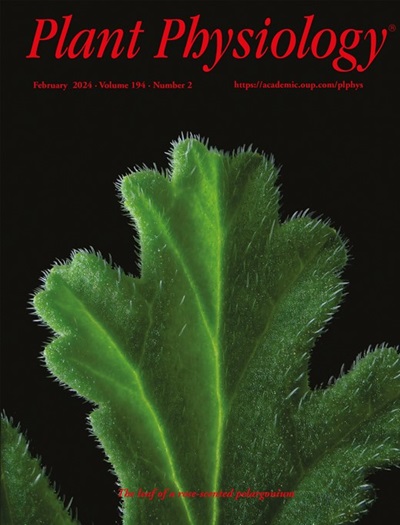The regulatory landscape of β-caryophyllene biosynthesis in pak choi.
IF 6.5
1区 生物学
Q1 PLANT SCIENCES
引用次数: 0
Abstract
β-Caryophyllene is a key volatile sesquiterpene involved in plant defense and contributes to the characteristic aroma of pak choi (Brassica campestris). This study aimed to elucidate the regulatory landscape of β-caryophyllene biosynthesis in pak choi to understand the genetic and molecular mechanisms controlling the production of this volatile sesquiterpene. Among 61 germplasm accessions of pak choi, β-caryophyllene was detected in only 11 accessions. Genetic analysis revealed that β-caryophyllene production is controlled by a single dominant gene. Fine mapping and gene sequencing identified the candidate gene B. campestris terpene synthases 21 (BcTPSa21), which encodes a β-caryophyllene synthase. Functional validation of BcTPSa21 through transient expression of BcTPSa21 in Nicotiana benthamiana leaves and enzyme activity assays in vitro confirmed its role in β-caryophyllene biosynthesis. A single nucleotide polymorphism (SNP) (C-T) in the promoter region of BcTPSa21 was found to affect the binding of the transcription factor BcMYC2, thereby influencing gene expression. Additionally, BcDIVARICATA (an R-R-type MYB TF BcDIV) was identified as a negative regulator of β-caryophyllene synthesis. The molecular experiments showed that abscisic acid participates in the biosynthesis of β-caryophyllene via the B. campestris pyrabactin resistance 1-like (BcPYL6)-BcDIVARICATA-BcMYC2 module. RNA-seq analysis suggested that under temperature stress, the transcription of BcTPSa21 and the biosynthesis of β-caryophyllene were the collective result of multilevel regulation. These findings provide comprehensive insights into the regulatory mechanisms governing β-caryophyllene biosynthesis in pak choi, identifying key factors and regulatory modules involved and offering a foundation for enhancing the flavor quality of pak choi through targeted genetic interventions.小白菜β-石竹烯生物合成的调控格局。
β-石竹烯是一种重要的挥发性倍半萜,参与植物防御,是白菜特有香气的重要组成部分。本研究旨在阐明小白菜中β-石竹烯生物合成的调控格局,以了解这种挥发性倍半萜产生的遗传和分子机制。在61份小白菜种质材料中,仅有11份材料检测到β-石竹烯。遗传分析表明,β-石竹烯的产生受一个显性基因控制。通过精细定位和基因测序,鉴定出编码β-石竹烯合成酶的候选基因B. campestris terpene synthases 21 (BcTPSa21)。通过在烟叶中瞬时表达BcTPSa21和体外酶活性测定对BcTPSa21的功能进行验证,证实了其在β-石蜡烯生物合成中的作用。发现BcTPSa21启动子区域的单核苷酸多态性(SNP) (C-T)影响转录因子BcMYC2的结合,从而影响基因的表达。此外,BcDIVARICATA(一种r - r型MYB TF BcDIV)被鉴定为β-石竹烯合成的负调节因子。分子实验表明,脱落酸通过B. campestris pyrabactin resistance 1-like (BcPYL6)-BcDIVARICATA-BcMYC2模块参与了β-石竹烯的生物合成。RNA-seq分析表明,在温度胁迫下,BcTPSa21的转录和β-石竹烯的生物合成是多水平调控的集体结果。这些研究结果为白菜β-石竹烯生物合成的调控机制提供了全面的见解,确定了参与的关键因素和调控模块,并为通过有针对性的基因干预提高白菜风味品质提供了基础。
本文章由计算机程序翻译,如有差异,请以英文原文为准。
求助全文
约1分钟内获得全文
求助全文
来源期刊

Plant Physiology
生物-植物科学
CiteScore
12.20
自引率
5.40%
发文量
535
审稿时长
2.3 months
期刊介绍:
Plant Physiology® is a distinguished and highly respected journal with a rich history dating back to its establishment in 1926. It stands as a leading international publication in the field of plant biology, covering a comprehensive range of topics from the molecular and structural aspects of plant life to systems biology and ecophysiology. Recognized as the most highly cited journal in plant sciences, Plant Physiology® is a testament to its commitment to excellence and the dissemination of groundbreaking research.
As the official publication of the American Society of Plant Biologists, Plant Physiology® upholds rigorous peer-review standards, ensuring that the scientific community receives the highest quality research. The journal releases 12 issues annually, providing a steady stream of new findings and insights to its readership.
 求助内容:
求助内容: 应助结果提醒方式:
应助结果提醒方式:


